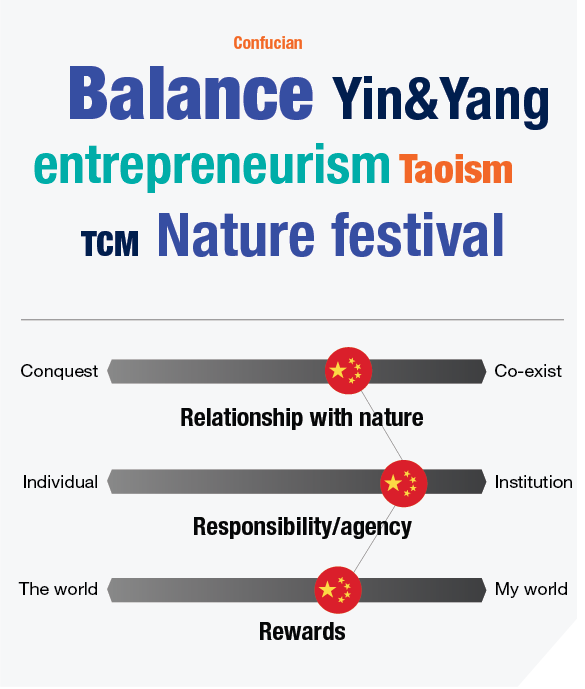

ESG across borders: China
 China’s culture is one of balance, regulation and moderation: yin and yang, Taoism, Confucianism. Traditional Chinese medicine revolves around taking the best of nature and sharing that benefit with people and the surroundings. Many of China’s cultural festivals concern nature, whether it’s the moon, harvest, water or the seasons. At the same time, there is a strong focus on entrepreneurism and state capitalism, which often works at cross purposes to ESG mandates.
China’s culture is one of balance, regulation and moderation: yin and yang, Taoism, Confucianism. Traditional Chinese medicine revolves around taking the best of nature and sharing that benefit with people and the surroundings. Many of China’s cultural festivals concern nature, whether it’s the moon, harvest, water or the seasons. At the same time, there is a strong focus on entrepreneurism and state capitalism, which often works at cross purposes to ESG mandates.
The 1990s and early 2000s – the peak of China’s economic development – was a period of unbridled entrepreneurialism. This led to many ESG breaches: contamination, pollution, deforestation, unethical and environmental practices around sourcing and processing. But Chinese people began to see the severe threat to the environment, even to their personal health and safety. The environmental aspect of entrepreneurialism has therefore become an urgent imperative.
 In terms of the three drivers that shape the culture of ESG, China’s relationship with nature is characterised by co-existence, balance, and a need to be respectful and mindful of how nature is used and engaged with. Because the government is such a big agent and trusted to do its best, and because China is an extremely collectivist society, the Chinese place responsibility to take the lead on addressing ESG issues with institutions – not just the government but also the business and private sector too. When it comes to rewards, there is more of a balanced picture. While there is a slight lean towards prioritising actions that bring a benefit to individuals’ immediate community, this is increasingly coupled with an awareness and attention towards the need to be ESG compliant, especially when it comes to personal wellbeing and similar issues. So there is a growing commitment to moving towards longer-term rewards too.
In terms of the three drivers that shape the culture of ESG, China’s relationship with nature is characterised by co-existence, balance, and a need to be respectful and mindful of how nature is used and engaged with. Because the government is such a big agent and trusted to do its best, and because China is an extremely collectivist society, the Chinese place responsibility to take the lead on addressing ESG issues with institutions – not just the government but also the business and private sector too. When it comes to rewards, there is more of a balanced picture. While there is a slight lean towards prioritising actions that bring a benefit to individuals’ immediate community, this is increasingly coupled with an awareness and attention towards the need to be ESG compliant, especially when it comes to personal wellbeing and similar issues. So there is a growing commitment to moving towards longer-term rewards too.
Our segmentation study[12] of consumers and their attitudes towards ESG finds that China has one of the highest proportions of Pragmatists – people who are practical and pragmatic in the way they adopt practices around ESG into their everyday lives. This is not surprising, as pragmatism is a value strongly embedded in Chinese culture. In looking to address ESG issues, the Chinese prioritise innovative solutions that can be easily adopted which results in a lot of green tech e.g. electric vehicles.
In looking to address ESG issues, the Chinese prioritise innovative solutions that can be easily adopted, which results in a lot of green tech.
Alibaba’s forest campaign is a prime example of success through smart innovation. Alibaba gamified ‘green behaviours’, awarding Alipay users with ‘green energy points’ whenever they made low-carbon lifestyle choices e.g. taking public transportation or holding video meetings instead of commuting to the office. The user can see their points building up in the form of a virtual tree growing on their app. Once users have accrued a certain amount of points, the company plants a real tree.
This tapped into the belief that we all need to do something to help the environment, allowing consumers to drive reforestation action and commit to participation, contribution and achievement. This is typical of how the Chinese look for a smart, innovative way, using technology, to address an issue – nothing is unsurmountable.
Historically, there are many practices around the E of ESG. Take traditional farming – China is famous for terrace fields, the canal system, following lunar calendar cycles for farming and planting, the concept of feng shui and harmony with different elements like water, wind, wood, metal, so on and so forth.
 To a lesser extent, S has also been important, especially for companies operating in China. In a market with a collectivist tendency, consumers expect brands to act when a major public disaster happens e.g. an earthquake or a flood. International brands will need to take account of these expectations to achieve brand success.
To a lesser extent, S has also been important, especially for companies operating in China. In a market with a collectivist tendency, consumers expect brands to act when a major public disaster happens e.g. an earthquake or a flood. International brands will need to take account of these expectations to achieve brand success.
Increasingly, we see a growing skew to health and wellness coming through, especially in the form of holding businesses accountable to ensure that they are doing healthy sourcing and that they are not damaging the environment in their processes. This has become increasingly important, with consumers willing to pay a premium for brands that have better, safer and healthier sourcing and environmental practices – especially in categories like infant formula or food and beverages. We also see growing trends in social sustainability surrounding the treatment of people in the workplace, labour laws and gender equality.
Although a large economy, China’s development has been unevenly distributed and in many regions the living standards are still yet to be improved. Several years ago, the northern province of Hebei put in place a complete ban on the use of coal to heat homes, in an attempt to improve air quality and meet environmental targets.[16] But many villages had not been able to convert to gas, and alternative green energy was simply not ready for less developed areas. Many homes were left without heating in sub-zero temperatures. The incident triggered huge anger among the general public who urged the government to find a better balance between environmental protection and basic living rights. This balance and compromise is another key factor that characterises ESG practices in China.
Notes
[12] Ipsos. 2022. “Environmental Sustainability: Who Cares?”
[16] BBC. “China does U-turn on coal ban to avert heating crisis”. BBC, 8 December, 2017
Table of contents
- ESG across borders: the cultural context
- "Sustainability": All on the same page?
- Equality Kaleidoscope
- The climate of climate change opinion
- Applying cultural transferability analysis to ESG
- ESG across borders: United States of America
- ESG across borders: India
- ESG across borders: Brazil
- ESG across borders: South Africa
- ESG across borders: China
| Previous |



![[Webinar] KEYS: What can we learn from what happened in 2025?](/sites/default/files/styles/list_item_image/public/ct/event/2025-12/keys-webinar-what-happened-in-2025-carousel.webp?itok=1gJKCCxx)